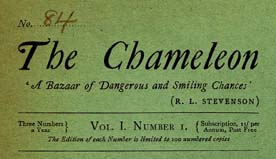E. F. Gill questioned Oscar Wilde about two poems written by Lord Douglas that appeared in the issue of The Chameleon that contained Wilde's "Phrases and Philosophies for the Use of the Young." Gill asked Wilde if he saw any improper suggestions in the two poems. Wilde's response to Gill's question as to what was "the love that dare not speak its name" provided one of the most memorable moments of a memorable trial (see transcript page).

Two Loves
Reprinted from The Chameleon, December 1894. See highlighted lines.
I dreamed I stood upon a little hill,
And at my feet there lay a ground, that seemed
Like a waste garden, flowering at its will
With buds and blossoms. There were pools that dreamed
Black and unruffled; there were white lilies
A few, and crocuses, and violets
Purple or pale, snake-like fritillaries
Scarce seen for the rank grass, and through green nets
Blue eyes of shy peryenche winked in the sun.
And there were curious flowers, before unknown,
Flowers that were stained with moonlight, or with shades
Of Nature's willful moods; and here a one
That had drunk in the transitory tone
Of one brief moment in a sunset; blades
Of grass that in an hundred springs had been
Slowly but exquisitely nurtured by the stars,
And watered with the scented dew long cupped
In lilies, that for rays of sun had seen
Only God's glory, for never a sunrise mars
The luminous air of Heaven. Beyond, abrupt,
A grey stone wall. o'ergrown with velvet moss
Uprose; and gazing I stood long, all mazed
To see a place so strange, so sweet, so fair.
And as I stood and marvelled, lo! across
The garden came a youth; one hand he raised
To shield him from the sun, his wind-tossed hair
Was twined with flowers, and in his hand he bore
A purple bunch of bursting grapes, his eyes
Were clear as crystal, naked all was he,
White as the snow on pathless mountains frore,
Red were his lips as red wine-spilith that dyes
A marble floor, his brow chalcedony.
And he came near me, with his lips uncurled
And kind, and caught my hand and kissed my mouth,
And gave me grapes to eat, and said, 'Sweet friend,
Come I will show thee shadows of the world
And images of life. See from the South
Comes the pale pageant that hath never an end.'
And lo! within the garden of my dream
I saw two walking on a shining plain
Of golden light. The one did joyous seem
And fair and blooming, and a sweet refrain
Came from his lips; he sang of pretty maids
And joyous love of comely girl and boy,
His eyes were bright, and 'mid the dancing blades
Of golden grass his feet did trip for joy;
And in his hand he held an ivory lute
With strings of gold that were as maidens' hair,
And sang with voice as tuneful as a flute,
And round his neck three chains of roses were.
But he that was his comrade walked aside;
He was full sad and sweet, and his large eyes
Were strange with wondrous brightness, staring wide
With gazing; and he sighed with many sighs
That moved me, and his cheeks were wan and white
Like pallid lilies, and his lips were red
Like poppies, and his hands he clenched tight,
And yet again unclenched, and his head
Was wreathed with moon-flowers pale as lips of death.
A purple robe he wore, o'erwrought in gold
With the device of a great snake, whose breath
Was fiery flame: which when I did behold
I fell a-weeping, and I cried, 'Sweet youth,
Tell me why, sad and sighing, thou dost rove
These pleasent realms? I pray thee speak me sooth
What is thy name?' He said, 'My name is Love.'
Then straight the first did turn himself to me
And cried, 'He lieth, for his name is Shame,
But I am Love, and I was wont to be
Alone in this fair garden, till he came
Unasked by night; I am true Love, I fill
The hearts of boy and girl with mutual flame.'
Then sighing, said the other, 'Have thy will,
I am the love that dare not speak its name.'
In Praise of Shame
Last night unto my bed bethought there came
Our lady of strange dreams, and from an urn
She poured live fire, so that mine eyes did burn
At the sight of it. Anon the floating fame
Took many shapes, and one cried: "I am shame
That walks with Love, I am most wise to turn
Cold lips and limbs to fire; therefore discern
And see my loveliness, and praise my name."
And afterwords, in radiant garments dressed
With sound of flutes and laughing of glad lips,
A pomp of all the passions passed along
All the night through; till the white phantom ships
Of dawn sailed in. Whereat I said this song,
"Of all sweet passions Shame is the loveliest."
